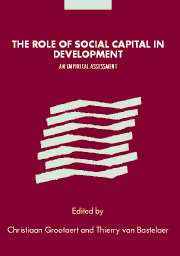Book contents
- Frontmatter
- Contents
- List of figures and maps
- List of tables
- List of boxes
- Notes on contributors
- Acknowledgments
- Foreword by Robert D. Putnam
- Introduction and overview
- Part 1 Social capital at the micro and macro levels: a conceptual discussion and review
- Part 2 The impact of social capital on development
- 3 Mapping and measuring social capital through assessment of collective action to conserve and develop watersheds in Rajasthan, India
- 4 Social capital and the firm: evidence from agricultural traders in Madagascar
- 5 How do participation and social capital affect community-based water projects? Evidence from Central Java, Indonesia
- 6 Does social capital increase participation in voluntary solid waste management? Evidence from Dhaka, Bangladesh
- Part 3 The creation and transformation of social capital
- Conclusion: measuring impact and drawing policy implications
- Index
- References
3 - Mapping and measuring social capital through assessment of collective action to conserve and develop watersheds in Rajasthan, India
Published online by Cambridge University Press: 22 September 2009
- Frontmatter
- Contents
- List of figures and maps
- List of tables
- List of boxes
- Notes on contributors
- Acknowledgments
- Foreword by Robert D. Putnam
- Introduction and overview
- Part 1 Social capital at the micro and macro levels: a conceptual discussion and review
- Part 2 The impact of social capital on development
- 3 Mapping and measuring social capital through assessment of collective action to conserve and develop watersheds in Rajasthan, India
- 4 Social capital and the firm: evidence from agricultural traders in Madagascar
- 5 How do participation and social capital affect community-based water projects? Evidence from Central Java, Indonesia
- 6 Does social capital increase participation in voluntary solid waste management? Evidence from Dhaka, Bangladesh
- Part 3 The creation and transformation of social capital
- Conclusion: measuring impact and drawing policy implications
- Index
- References
Summary
Social capital is a popular current concept in the development literature and in development agencies. But is it real enough to be measured in the field and validated by achievement of desired outcomes of development programs? Is it something that can be purposefully increased? This chapter reports on the observed relationships between social capital measures and development outcomes in sixty-four villages in the Indian State of Rajasthan. Since 1991 these villages have participated in a watershed conservation and development program funded by the Indian government and the World Bank. The villages provide an empirical basis for evaluating whether social capital can be identified and measured quantitatively.
The database includes interviews with 2,397 individuals, split about evenly between men and women; sixty-four focus group sessions with village leaders and elected representatives; and relevant village- and household-level data obtained from official records. By classifying the villages' performance in restoring their degraded or vulnerable common lands through collective action as having been high, medium, or low, we assess whether certain social-structural or cognitive variables associated with social capital can explain differences in the measured manifestations of mutually beneficial collective action – the benefit flow we associate with and expect to observe from the asset of social capital.
We find that an index of social capital variables is positively and consistently correlated with superior development outcomes, both in watershed conservation and in cooperative development activities more generally.
- Type
- Chapter
- Information
- The Role of Social Capital in DevelopmentAn Empirical Assessment, pp. 85 - 124Publisher: Cambridge University PressPrint publication year: 2002
References
- 47
- Cited by



